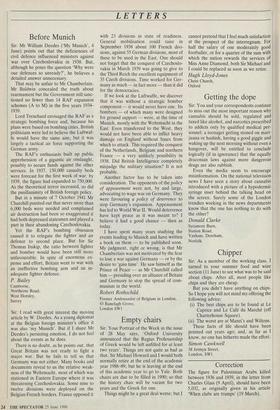Sir: I read with great interest the moving article by
W. Deedes. As a young diplomat at the Belgian foreign minister's office it was also 'my Munich'. But if I share Mr Deedes's persisting emotion, I do not feel about the events as he does.
There is no doubt, as he points out, that Great Britain was not ready to fight a major war. But he fails to tell us that Germany was not either. Many books and documents reveal to us the relative weak- ness of the Wehrmacht, most of which was stationed in Eastern Europe where it was threatening Czechoslovakia. Some nine to twelve divisions were deployed on the Belgian-French borders. France opposed it with 23 divisions in state of readiness. General mobilisation could raise in September 1938 about 100 French divi- sions, against 55 German divisions, most of these to be used in the East. One should not forget that the conquest of Czechoslo- vakia in March 1939 was going to give to the Third Reich the excellent equipment of 35 Czech divisions. Time worked for Ger- many as much — in fact more — than it did for the democracies.
If we look at the Luftwaffe, we discover that it was without a strategic bomber component — it would never have one. Its bombers — of which many were designed for ground support — were, at the time of Munich, mostly with the Wehrmacht in the East. Even transferred to the West, they would not have been able to inflict heavy damage on England without bases from which to attack. This required the conquest of the Netherlands, Belgium and northern France — a very unlikely possibility in 1938. Did British Intelligence completely misjudge the military situation? It is not probable.
Another factor has to be taken into consideration. The opponents of the policy of appeasement were not, by and large, advocating to wage war on Germany. They were favouring a policy of deterrence to stop Germany's expansion. Appeasement has led to World War II. Would deterrence have kept peace as it was meant to? I believe it had a good chance — then as today.
I have spent many years studying the events leading to Munich and have written a book on them — to be published soon. My judgment, right or wrong, is that Mr Chamberlain was not motivated by the fear to lose a war against Germany — or by the desire to 'gain time'. He saw himself as the Prince of Peace — as Mr Churchill called him — presiding over an alliance of Britain and Germany to stop the spread of com- munism in the world.
Robert Rothschild
Former Ambassador of Belgium in London, 43 Ranelagh Grove, London SW1










































































 Previous page
Previous page